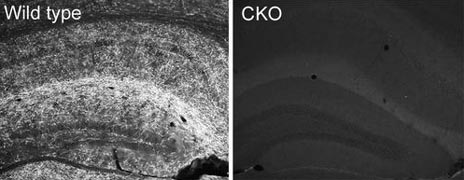

Serotonin transporter staining in hippocampus
Serotonin (5-HT), an important neurotransmitter, has been implicated in a wide range of disorders such as depression, anxiety, post-traumatic stress disorder (PTSD), and learning and memory disorders.
Recent work of CAS researchers has shown that mice lacking serotonin are less anxious compared to control animals but retain fearful memories for much longer time.
The results, which were published online in
Proceedings of the National Academy of Sciences, may contribute towards developing treatments for post-traumatic stress disorder (PTSD), where long lasting fearful memories bring constant pain and sufferings to individuals who cannot forget them.
In order to study the role of serotonin in the adult brain, the researchers developed a genetic method to specifically remove serotonin-producing neurons from the mouse brain, leaving intact all other types of neurons, many of which express receptors for serotonin. They then compared the behavior of these serotonin knockout mice with control mice in experiments which test their ability to respond to anxious or fearful situations.
The scientists found that the knockout mice were more carefree compared to controls in the open portion of an elevated plus maze, suggesting they were less anxious. However, in experiments in which these mice received electric foot shocks in a specific cage, serotonin knockout mice appeared to retain unpleasant memories of the cage for a very long time, whereas the controls were able to forget. This rather unusual behavior can be reversed by direct injection of serotonin into the brain of knockout mice, showing that it is really the specific loss of this transmitter in these knockout mice that is responsible for their long lasting fearful memories.
This work was a collaborative effort between the laboratory of Dr. XU Lin at the CAS Kunming Institute of Zoology, and the laboratories of Dr. XU Tianle and Dr. DING Yuqiang at the CAS Institute of Neuroscience, with most experimental work carried out by graduate students DAI Jinxia and HAN Huili.








